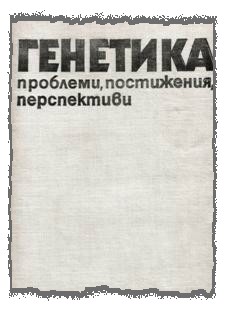
GENETICS ~ PROBLEMS, ACHIEVEMENTS AND PERSPECTIVES
Author: Gencho Genchev

We have been trying to construct a coherent picture for the development of genetics in this country, however, efforts have led us to few viable clues of minor importance. We are going to present them in a chronological order and just for the sake of a protocol. As a beginning, there are not any traces for existence of generalized genetic knowledge in the study curriculum of bulgarian university societies. The significance of Mendel's experiments were long time unrecognized and the units - i.e., called factors by Gregor Mendel and genes by modern biologists - were not related to any perceptible or otherwise comprehensible entity. Notwithstanding, first attempts to explain to a lay community and put some general foundation for a genetic knowledge were made by university professors Prof. S. Konsulov and Prof. M. Popov. As we have mentioned before, those two have led courses on various aspects of biological knowledge and some preliminary factology data were included in their lectures from the 1930s of the past century. These was quite inadequate and in the lore of modern development of science it counted almost to nothing. Our alternative research have found that even by the late 1950s and early 1960s, furthermore the genetic structure of the chromosome was not clarified. It became possible with more advances in molecular and microscopic techniques - namely, the X-ray mass spectrography and the electronic scintilographic microscopy, etc. Obviously, one cannot measure something that he can't see or observe.
Another line of research have led us to some fields of more unrecognizable patterns /i.e., at least for specialists with humanitarian background/. As early as the 1920s of the past century agro-biological science in this country have received a strong impetus. The problems of food shortage were pondering at the gate of any whatsoever cultural country on this planet Earth and steps were taken for adequate solutions. In Bulgaria, subsequently with many other European countries, a belt of experimental agricultural stations were created. For this country, it was precluded with agro-stations "Obraztsov Chiflik" /i.e., for Northern Bulgaria/ and "Sadovo" /i.e., for Southern Bulgaria/; also, some other smaller farms were functioning as agro-stations with lesser national importance. Within these premises and the first bulgarian agro-specialists have been experimenting on plant breeding. The author of these lines have some very fragmentary knowledge on the scope of activities from that times. It is based on secondhand literature surveys and includes the following - viz., there have been names of two specialists on hybridization /i.e., M. Hristov and G. Genchev/, who have practiced on the problems of "heterosis" with the plant species g. Triticum /i.e., common wheat/ and g. Nicotiana /i.e., common tobacco/. Their research have found place in a couple of scholarly articles and two major monographs - viz., "M. Hristov. Genetics - Universitetska Biblioteka № 172, 1936" and "G. Genchev. Genetics - Universitetska Biblioteka № 172, 1947". We haven't been able to obtain those books personally, but it is possible to make some conjectures on their study matter and contents. For instance, a key to "heterosis" is the inheritance of quantitative characteristics of the breed and exemplified by gain in such factors as size, yield, etc. A second problem with hybridization from that period was the introduction of fertilizers, which effected in increasing the crop but some breeds responded by developing weak stalks and susceptibility to various diseases. Such were the issues from plant genetics in the era before the advance of molecular techniques and possibility for new biotechnology. However, this is beyond scope of our presentation.
Herewith, we have succeeded to give a short outline on the state of genetics in this country before the 1950s and the beginning of the Cold War era. As we have said elsewhere, this is a period with prevalence of communist dogmatism in science and parallel increase of armament race with tactical weaponry. With minor deflections, this tendency have continued until the fall of the communist system and dawn of democracy in Eastern Europe. As a matter of fact, we have been making this interlude for the purposes of the book at hand. A more pretentious reviewer will be disappointed, if he couldn't find enough merit on the pages of this typically socialist piece of writing. It is inevitable, that the book from G. Genchev reflects the shortcomings of the past Lysenko's period and the obvious delay in the efforts to compensate for the lost momentum in science.
One last thing worth mentioning and this should preclude our short presentation. For a period of 45 years, many beautifully written and well designed books have been translated from foreign languages into bulgarian. The quality of this job is hardly under any surveillance procedure, nevertheless there are many titles from the referred international literature that have found place in the library of the eager bulgarian scholar. More titles are available in russian translation, but this language was accessible for wide variety of purposes and including university research from bulgarian scholars. The merits of this perusal is beyond a doubt dubious, however we are not in a position to judge the consequences of this double standard procedure and neither to meddle in the policy of the publishing houses. For the purposes of this commentary we offer to the interested reader two books from famous American authors /i.e., authorities in molecular and population biology/ and translated in russian language - viz., "A. Lehninger. Principles of Biochemistry" and "K. Vogel and A. Motulsky. Human Genetics". No more details are available on the russian editions, but the author of these lines have seen them "de visu".
Copyright © 2006 by the author.